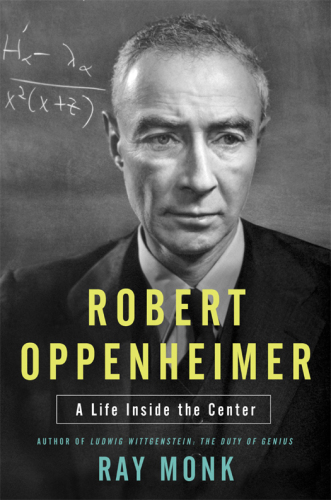
Robert Oppenheimer
A Life Inside the Center
کتاب های مرتبط
- اطلاعات
- نقد و بررسی
- دیدگاه کاربران
نقد و بررسی

May 20, 2013
It's difficult to find a more complicated figure in 20th century physics than J. Robert Oppenheimer. While previous biographies have examined Oppenheimer's philosophy and politics, Monk's work stands apart for its attention to his work in physics. Born in 1904 to a well-off German Jewish family, Oppenheimer had a sheltered childhood and grew into an unrepentant "intellectual snob", putting mas-tery above sociability. Monk (Ludwig Wittgenstein: The Duty of Genius) captures Oppenheimer's zeal; a Harvard undergraduate dividing his time between chemistry and literatureâuntil he discovered physics. Clumsiness in the lab and fascination with quantum mechanics led him to theoretical physics where he excelled. Monk connects Oppenheimer's drive to succeed with his skill at building power-house teams of physicists: at Berkeley, where he created the first American school of theoretical phys-ics; at Los Alamos, where he guided the Manhattan Project; and after WWII at the Institute for Ad-vanced Study in Princeton, NJ. Monk explores the tangled politics that surrounded Oppenheimer as well as his weapons work, while celebrating the physicist's work on cosmic rays and stellar collapse. This grand biography illuminates the genius of a fascinating scientist as driven by his own research as he was driven to lead and inspire others.

Starred review from April 15, 2013
A highly detailed examination of the life and times of Robert Oppenheimer (1904-1967), the man who ushered in the Atomic Age and played a leading role in putting American science on the map. Monk (Philosophy/Southampton Univ.; Bertrand Russell: The Ghost of Madness, 1921-1970, 2001, etc.) does full justice to Oppenheimer's irreplaceable contribution to the development of nuclear energy during and after World War II. The author also addresses his less well-known contributions to nuclear physics, including "a method that is used even now for understanding the physical processes that occur in the interiors of stars." Born to an affluent Jewish family, Oppenheimer had a privileged upbringing (private schools, Harvard University and extensive study abroad), yet he faced a rising tide of anti-Semitism even in America. Among many examples, Monk quotes a reference by George Birkhoff, Harvard's most eminent mathematician, supporting his application: "He is Jewish but I should consider him a very fine type of man." In 1927, Oppenheimer co-authored a paper on quantum chemistry with the leading quantum physicist, Max Born, but in Europe, he faced anti-American prejudice among scientists such as Paul Dirac. Monk explains that experiences such as these prompted Oppenheimer to accept a joint teaching position in California, at Berkeley and Caltech, where he devoted himself to establishing "a world center of theoretical physics in the U.S." The Spanish Civil War drew Oppenheimer into left-wing politics (and surveillance by the FBI), but he also had a distinguished career during WWII as head of the Manhattan Project and after, when he played a key role in shaping American nuclear policy. In 1954, renewal of his security clearance was denied, a miscarriage of justice that President John F. Kennedy reversed by awarding him the prestigious Fermi Prize. A top-notch biography of Oppenheimer to sit alongside Kai Bird and Martin Sherwin's American Prometheus (2006).
COPYRIGHT(2013) Kirkus Reviews, ALL RIGHTS RESERVED.

December 1, 2012
Author of Ludwig Wittgenstein: The Duty of Genius, winner of both the Mail on Sunday/John Llewellyn Rhys and the Duff Cooper prizes, University of Southampton, UK, philosophy professor Monk here takes on an even more enigmatic character. Robert Oppenheimer led the Manhattan Project but was sufficiently stunned by the atomic bomb's destructive power that he refused to participate in the creation of the hydrogen bomb. That eventually lost him his security clearance. The portrait of a brilliant physicist who loved Sanskrit and engaged in radical politics.
Copyright 2012 Library Journal, LLC Used with permission.

Starred review from May 1, 2013
Robert Oppenheimer believed that when we are blind to the evil in ourselves, we dehumanize ourselves. In this deeply humanizing biography, Monk invites readers to contemplate the unexpected eviland goodin the man known as the father of the A-bomb. Though he acknowledges debts to Bird and Sherwin's American Prometheus (2005), Thorpe's Oppenheimer(2006), and Pais' J. Robert Oppenheimer (2006), Monk delves deeper than any predecessor into Oppenheimer's inner life, not his historical or political circumstances. By diving deep into that turbid inner life, readers learn that in confessing that as a Manhattan Project scientist, he had known sin, Oppenheimer was expressing regret for intellectual pride, not guilt for the deaths at Hiroshima. Sustained probing also exposes the character defects that made Oppenheimer vulnerable to McCarthy-era charges of disloyalty and that later made him a divisive director of the Institute for Advanced Study. Deep in Oppenheimer's psyche, Monk finds festering frustration at not having attained the stature of Einstein and Bohr. But readers may marvel at such frustration, given Oppenheimer's immense achievements as a pioneer in probing the heart of atoms and of black holes. Perceptive and detailed, this portrait illuminates a potent but complex mind.(Reprinted with permission of Booklist, copyright 2013, American Library Association.)

























دیدگاه کاربران